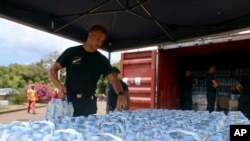The world produces about 400 million metric tons of plastic waste a year and less than 10% of it is recycled, according to the UN Environment Program.
At least 14 million metric tonnes ends up in the ocean every
year, the International Union for Conservation of Nature says, while more piles up in landfills.
International delegates meeting in the Kenyan capital for the third round of talks will consider a list of possible
measures to include in the treaty.
"I urge all the negotiators to recall that 2024 is only six weeks away and (there) are only two other meetings to go," Ruto said at the opening of the talks.
Governments agreed in March 2022 to put together a treaty on controlling plastic pollution by the end of next year. In Nairobi delegates will be haggling over whether to stick to their broad mandate of addressing the entire life cycle of plastics, including production, or to prioritize plastic waste management.
Kenya is among those who want a strong, binding agreement on the manufacture and use of plastics. It has enacted several laws banning certain uses of plastics, such as for shopping bags, since 2017.
"We must change the way we consume, the way we produce and how we dispose our waste," Ruto said.
"Change is inevitable. This instrument that we are working
on, is the first domino in that change. Let us bring it home,"
he said.
The plastic industry and oil and petrochemical exporters like Saudi Arabia do not want plastic use curtailed, arguing that the global deal should promote improved recycling and reuse of plastic.
"The vast majority of countries are eager to advance the negotiations to get the job done," said Pamela Miller, Co-Chair of the International Pollutants Elimination Network, a global public interest organization.
"On the other hand a small group of like-minded countries of mainly major fossil fuel, petrochemical and plastic exporters like Saudi Arabia and Russia, are actively attempting to take us backwards."
Saudi and Russian delegates were not immediately available
to comment.







![Juba's Plastic Waste Collection Turns Profitable [3:09]](https://gdb.voanews.com/984d6469-0142-4b89-a1ab-5f788a42015c_w33_r1.jpeg)






Forum